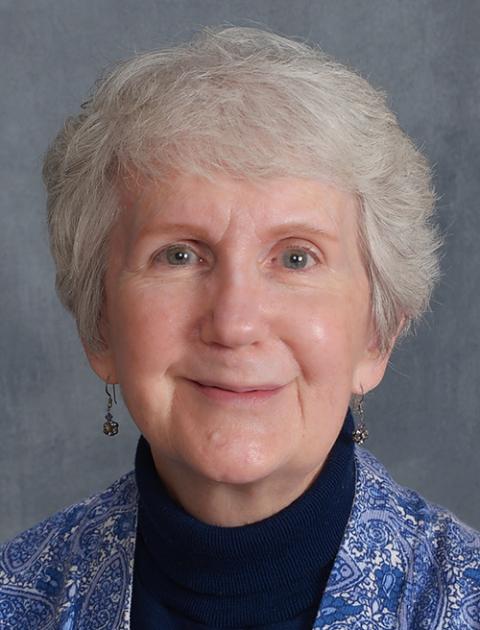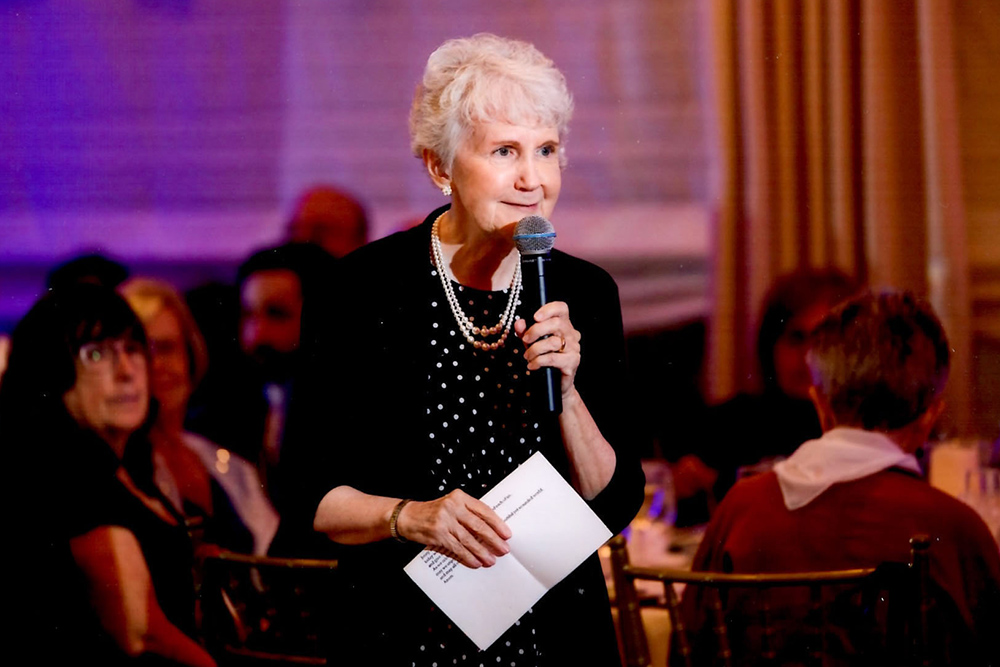
Immaculate Heart of Mary Sr. Christine Koellhoffer speaks at a wedding reception where she served as a co-minister. (Courtesy of Christine Koellhoffer)
Sr. Christine Koellhoffer of the Sisters, Servants of Immaculate Heart of Mary in Scranton, Pennsylvania, has devoted her life to helping others and characterizes her work as "steeped in the spirituality of social justice."
Koellhoffer has managed a spiritual direction practice for 22 years and served in leadership positions within her congregation as a counselor for spiritual resources. She spent 10 years as the communications director for the Intercommunity Center for Justice and Peace in Manhattan, New York, which she describes as a "coalition to integrate faith and justice."
Koellhoffer's work is deeply reflective. She describes her blog, "Mining the Now," as "my attempt to live with awareness of the present moment, observe how the world is unfolding around me, and share my everyday spirituality with others who might find it helpful."
She travels throughout the United States, offering guided retreats and presentations on spirituality, bearing witness and finding beauty in our "wounded world." Her work has appeared in numerous publications, including Living with Christ, Journey and Living Faith.
GSR: How has your passion for writing influenced your faith and spirituality and vice versa?
Koellhoffer: It begins with the Word. I think of John's Gospel: "In the beginning was the Word, and the Word was with God, and the Word was God." To me, that message of God's unconditional love is embodied in the Word that we call Jesus. That really underscores what I hope to do with my words and spirituality.
What I'm so conscious of as a writer and someone involved in spirituality ministry is I have a voice, and I can use that voice to contribute to the world's healing. I can be a voice for those on the margins who are overlooked, oppressed and silenced.
My writing is steeped in the spirituality of social justice. I can't get away from it. That's who I am. I pray daily for those who stumble upon or subscribe to my words. I'm very conscious of that and also very humbled by it.
Has your work as a spiritual leader and guide influenced your worldview? If so, in what ways?
I'm privileged because I get to spend time every day listening to the stuff of people's lives and how God is part of that. I meet hundreds of people of different races, religions and life experiences. Sometimes, they're very different from mine; sometimes, they're similar. But we share the longing for God by whatever name we call the divine.
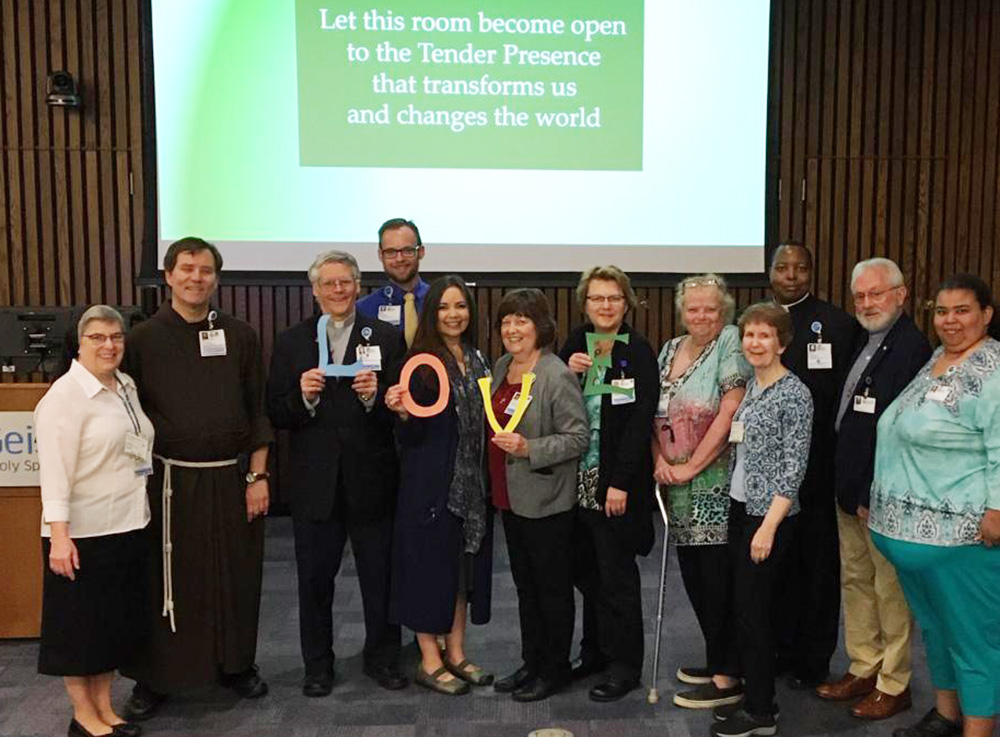
Immaculate Heart of Mary Sr. Christine Koellhoffer is seen with the Holy Spirit Hospital pastoral care team in Camp Hill, Pennsylvania, at the conclusion of a pastoral care day she led for chaplains and caregivers from the wider area. (Courtesy of Christine Koellhoffer)
I get to hear about their life of prayer and their struggles to be the face of love in this world. I reverence those relationships, and they humble me. They inspire me to be more open, compassionate and prayerful.
I've also been privileged to be part of human rights delegations to Haiti, El Salvador, Peru and Mexico. These neighbors took me in and taught me new ways of being and doing — different, sometimes, from the ones I've grown up with and become comfortable with.
My IHM community, the Sisters, Servants of the Immaculate Heart of Mary, also stretches my worldview. We say we are the face of God's unconditional love. To be part of a community that uses imagination, creativity and fresh thinking to bring about God's dream for this world is a grace.
How do you strike a balance between focusing on beauty and positivity and empathizing with the suffering of others? How do you stay optimistic and faithful while remaining pragmatic and choosing not to ignore the world's flaws?
Like Dostoevsky, I believe that "beauty will save the world," but not in a naive way. I'm always reflecting on how to hold the world's pain without being overwhelmed. We live in a global community. We have technology that puts us in touch with the suffering of others.
'I ask myself each day what I can do to be an agent of healing in this world that God so loves.'
I would love to go to Ukraine, Israel, Palestine or South Sudan, though I know I can't. But my prayer is not limited by geography. And when I take in beauty, I offer a prayer of thanks — something like, "I want everyone to have what I have in this moment." This privilege impels me to work towards a more loving and compassionate world.
My community uses a phrase I often use in my writing: "Our beautiful yet wounded world." Originally, we were saying our wounded world. But then someone said, "You know, it's also beautiful at the same time." So, we use the phrase "our beautiful yet wounded world."
In doing that, we acknowledge our world's breathtaking beauty and woundedness. I ask myself each day what I can do to be an agent of healing in this world that God so loves.
Advertisement
Do you often encounter people through your work who are questioning their beliefs? How do you reassure them?
Yes, I often meet people genuinely struggling with desolation and doubt. I tell them it's perfectly normal to question and doubt. It's also OK to share those feelings with God. Bring them to God with prayer and say, "This is how I'm feeling, and I'm not sure how to handle this."
I often think of Thomas Merton, the Trappist monk, who said a significant part of his vocation as a monk was "to sit with the insoluble dilemmas and the unanswerable questions of his time."
I call those spaces the in-between places. We don't like to be there. It's uncomfortable. We want closure. We want conclusions. We want to get to the finish line.
But I've learned to sit with those unanswerable questions and the insoluble dilemmas. They're uncomfortable, but sometimes they're the places of potential and grace.
How do you encourage people whose faith is faltering due to tragedy or disillusionment?
As a spiritual guide, I feel my primary role is to be a reverent listener. It's not to offer advice or solutions or be a fixer.
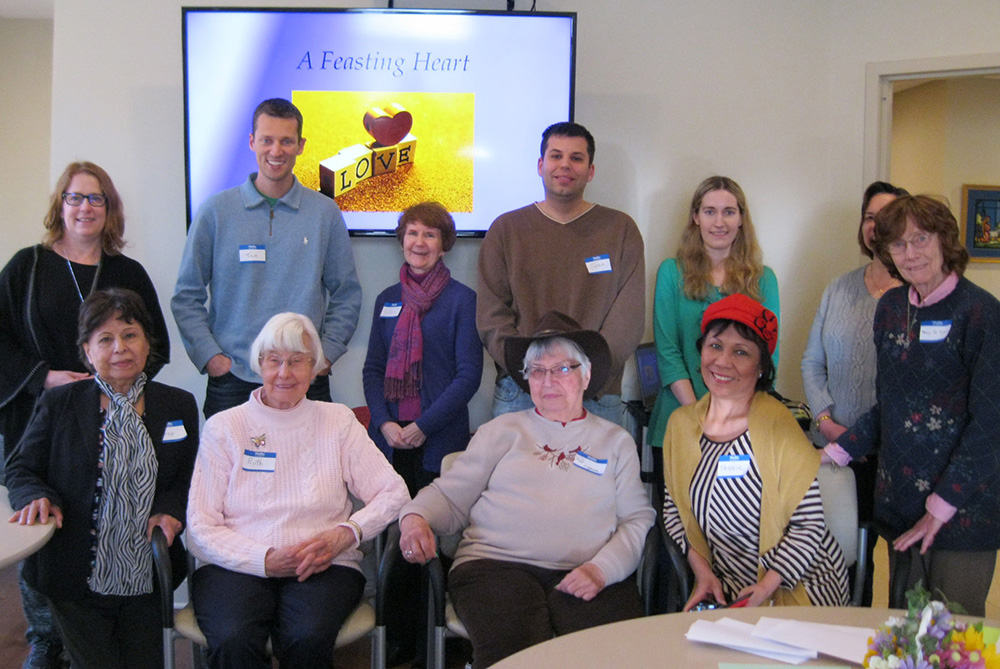
Immaculate Heart of Mary Sr. Christine Koellhoffer with a group who participated in a Lenten retreat day at Mount St. Mary House of Prayer in Watchung, New Jersey (Courtesy of Christine Koellhoffer)
I think I'm meant to be a witness to people's pain. One of my favorite quotes comes from David Augsburger, who says, "Being heard is so close to being loved, that for most people, they are indistinguishable."
The primary desire I often hear from people is simply to be heard. Even though I can't take away people's suffering or change their circumstances, I can witness and sit with people in their pain.
I think it's what God does. God stands with us in our pain and anguish. God weeps with us. God feels our heartache. God accompanies us and assures us that we will not be abandoned.
Do you have any advice for people working to find the spiritual path again, for people who may have lost their faith but wish to rediscover the path and rekindle their bond with the divine?
Yes, and those are often the people I meet. Many long to move forward on their spiritual path. There's a wonderful prayer by the Jesuit Fr. Joseph Whelan, and I'd like to read the beginning lines: "Nothing is more practical than finding God, that is, than falling in love in a quite absolute, final way. What you are in love with, what seizes your imagination, will affect everything."
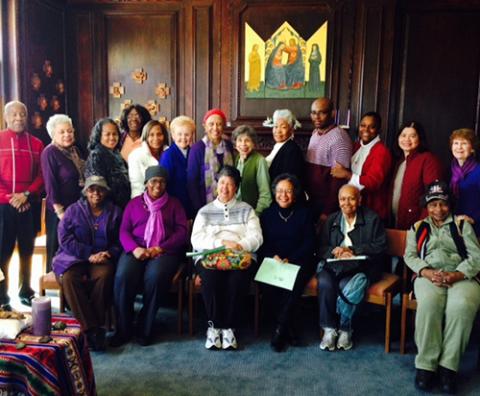
Parishioners of Christ the King Parish in Springfield Gardens, New York, during a Lenten retreat led by Immaculate Heart of Mary Sr. Christine Koellhoffer at Our Lady of Grace Center in Manhasset, New York (Courtesy of Christine Koellhoffer)
I invite reflection on questions like, what are you in love with? What seizes your imagination? What breaks your heart? What fills you with joy and gratitude?
Mining those questions can help clarify what a person desires, what they're looking for, and what they want from a deeper relationship with God.
I invite them to begin small. In some ways, a relationship with God is akin to a relationship with a friend. We spend time with him. We might even sit in silence with him. There doesn't have to be much talking but a lot of listening and time spent in silence.
Advent is right around the corner. How do you encourage people to find a balance of peace and celebration during the season, especially given the current perilous state of the world?
In Advent, we remember preparing for Jesus' birth in history and how Jesus continues to be born anew in our time and place. We remember also that the world into which Jesus was born waited in great longing. So, we celebrate that.
Simultaneously, we remember that the world into which Jesus was born was marred by oppression and suffering, much like our world today. I encourage us to remember both realities: born into a world longing for his coming and marked by oppression and strife.
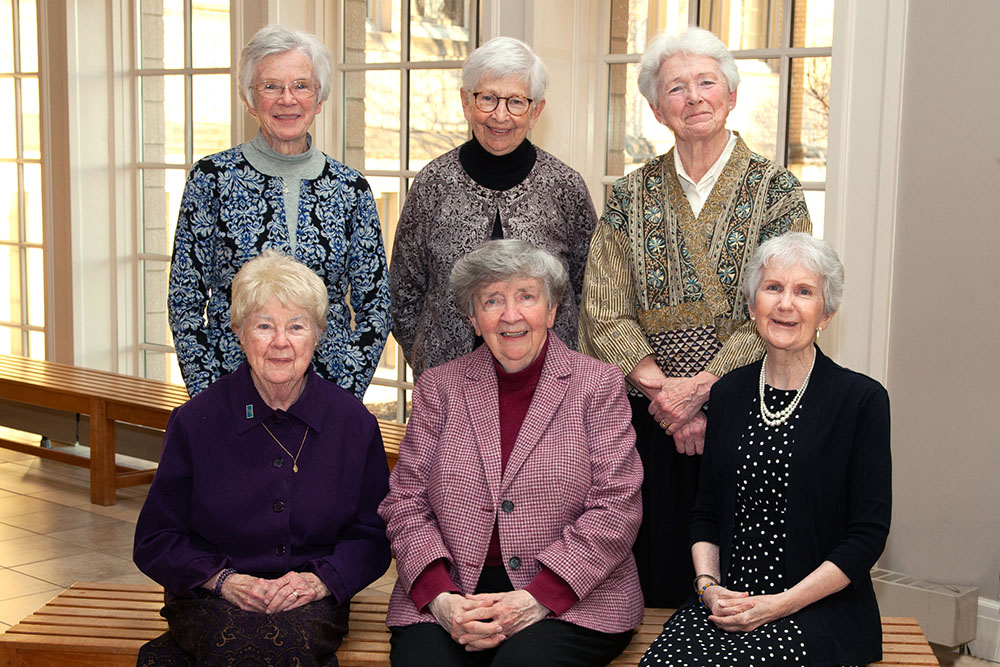
Sr. Christine Koellhoffer is pictured with other Sisters, Servants of the Immaculate Heart of Mary at the Ignatian Volunteer Corps of Northeastern Pennsylvania, where she led a prayer process for the inaugural Madonna della Strada awards in Scranton. (Courtesy of Christine Koellhoffer)
We also remember Mary and Joseph's journey in preparation for Jesus' coming. They were not welcome, and there was no place for them. It reminds me of the many refugees who also desire a home, safe shelter and a place of peace.
So, to commit to our Advent days is to commit to becoming people of peace in a different, deeper way.
What advice do you have for people struggling with stress and anxiety during this holy season? And how do you personally overcome feelings of negativity and hopelessness?
The season of Advent, with its themes of peace, joyful expectation and preparation, can get lost in the cultural push. To begin each day of Advent with intention, ask the Holy One to accompany us, determine what we desire from our relationship with God, and remember those for whom this season of joyful expectation is marked by tragedy and loss.
'God stands with us in our pain and anguish. God weeps with us. God feels our heartache. God accompanies us and assures us that we will not be abandoned.'
As for overcoming my feelings of negativity and hopelessness, I have a practice of naming. Throughout the day, I name what I'm feeling without judgment. There's great power in naming it because it allows me to pay attention to it and see if I need some spiritual adjustment. So, I spend some time in reflection and prayer.
I also meet with my spiritual director in times of negativity and lean on my friends — my IHM community.
I spend time in nature. I take walks. I tend to my plants. I listen to birdsong or music. Every day, I read one poem aloud and sit with it. I dance and do movements — it helps shake negativity off my body.
Most of all, I remind myself that no act of love is ever lost, forgotten or wasted. I reiterate my belief that every leaning into love and compassion, every act for a more just and inclusive world, and every prayer I breathe contribute in some way to the mystery of God and the healing and the wholeness of our beautiful yet wounded world. That's my prayer and my strategy.

